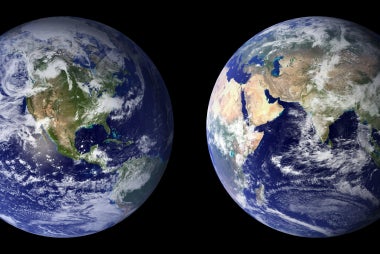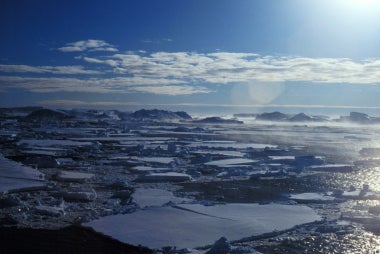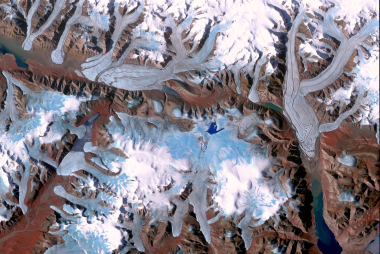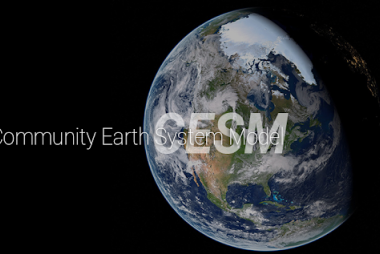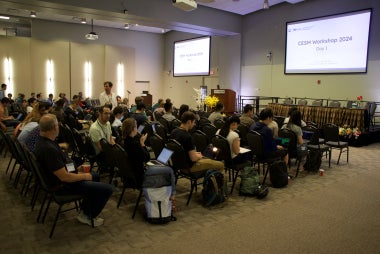October 2023 Newsletter
Welcome to our first quarterly Community Earth System Model (CESM) Newsletter, see below for updates and highlights. Want to receive our next newsletter in your inbox? Visit our newsletter page to subscribe and never miss a newsletter.
CESM Workshop 2023 Highlights and Updates
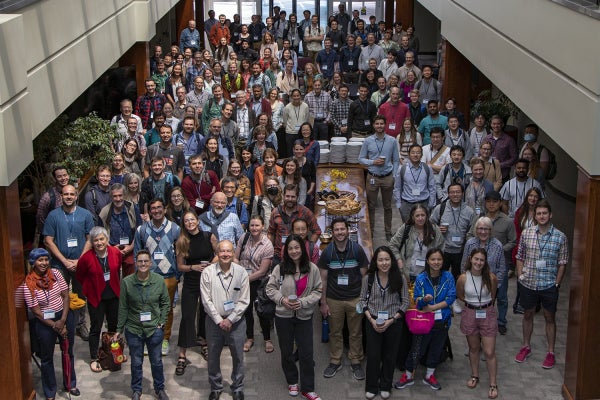
|
The 28th annual CESM Workshop was held from June 12th-14th, 2023 in Boulder, CO at the NCAR’s Center Green Campus. Some highlights can be found below.
Congratulations to Peter Lauritzen and Julio Bacmeister
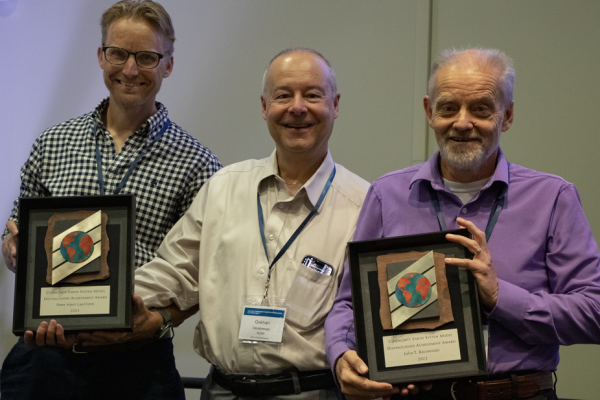
|
We are pleased to announce that Peter Lauritzen and Julio Bacmeister have jointly received the 2023 CESM Distinguished Award. The recognition is an acknowledgment of their exceptional contributions towards advancing our understanding of dynamical processes within CESM atmosphere models. Congratulations to Julio and Peter for this well-deserved achievement!
Together, Peter and Julio have delivered a streamlined and scale-consistent orography generation software, generalizable to multiple dynamical cores and horizontal resolutions. In addition to managing these important model development efforts, they have each generously offered their time to mentor and advise students, visitors, and postdocs as well as other members of the research community. In summary, their individual and joint contributions have elevated the rigor of the representation of dynamical processes in CAM, and in doing so delivered atmospheric models that have greater credibility in applications used across the CESM community. While their activities can be seen as somewhat “behind the scenes” development, it is important to recognize them as all CESM applications depend on the success of their contributions.
Congratulations to Claire Zarakas
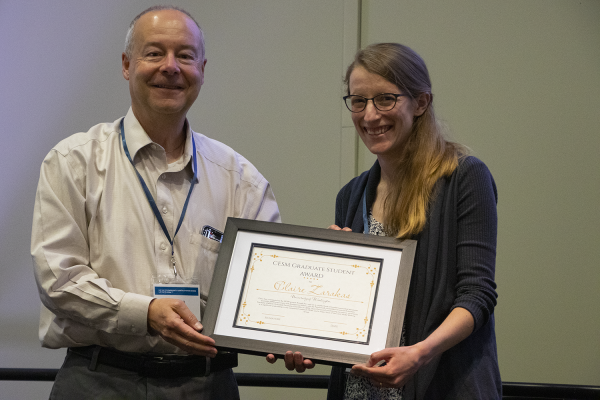
|
Claire received the 2023 CESM Graduate Student Award at the CESM workshop. She is a Ph.D. student expected to graduate in 2024 from the University of Washington in atmospheric sciences working with Professor Abigail Swann. Her body of work has made significant contributions to the CESM project. Claire provides high-level engagement in the land model working group as well.
Thank You to Gokhan Danabasoglu
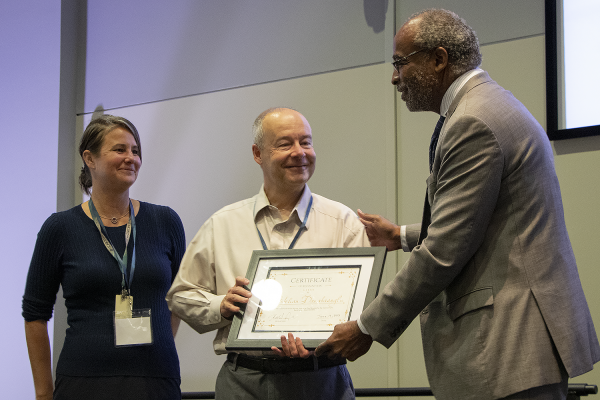
|
A huge thank you to Gokhan Danabasoglu for serving as our CESM Chief scientist position for 5 ½ years. From February 2018 to August 2023, Gokhan spent countless hours investing his time and hard work into CESM.
If you missed any of the 2023 CESM Workshop, you can view our workshop materials here.
The 29th annual CESM Workshop will be held from June 10th to June 13th, 2024. If you have any questions about this please reach out to Elizabeth Faircloth.
Highlights from the 2023 CESM Tutorial
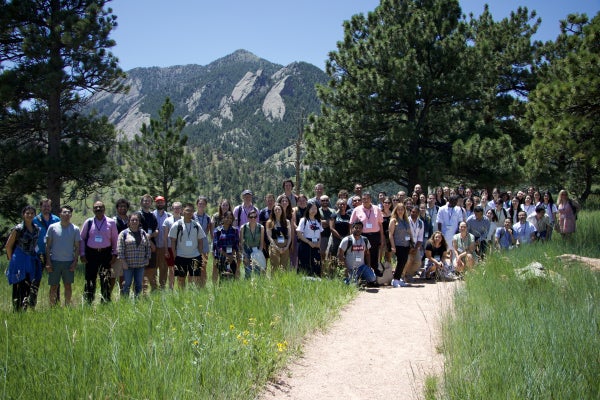
|
The 2023 CESM Tutorial was from July 10th-14th at the NCAR Mesa Lab in Boulder, CO. A total of 80 students were selected to participate. The CESM Tutorial is targeted at the graduate student level (2nd year and beyond) and we also encouraged postdocs, research scientists, and faculty members to attend.
If you missed any of the 2023 CESM Tutorial, you can watch all of the video replays from our YouTube channel tutorial playlist.
New CESM Chief Scientist
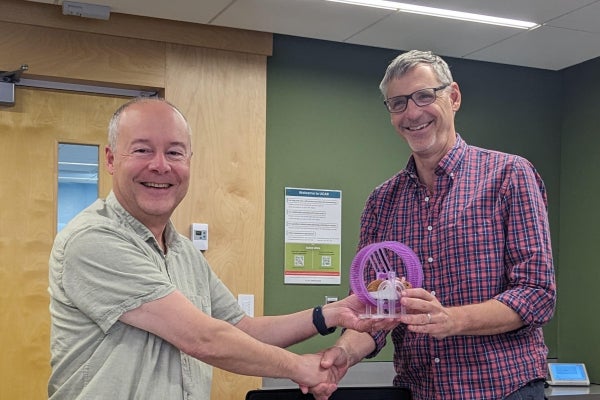
|
A message from David Lawrence, New CESM Chief Scientist:
First and foremost, I'd like to add my thanks to the chorus of praise to Gokhan Danabasoglu for his outstanding leadership of the CESM project over the last 5 years, especially for getting us through the pandemic on a path to CESM3 with our research community intact, along with many other successes. I hope to build on the work of Gokhan and CESM's vibrant community to continue to provide and support an ever-improving CESM as a critical research tool for Earth system science.
As I begin in this position, I have been reflecting on what I think is a compelling time for the whole Earth System modeling endeavor. As we evolve from a scientific focus on the fundamentals of climate change and Earth system feedbacks into a realm where the emphasis is on societal needs for information that will help us adapt to and mitigate against climate change, the inherent challenge is for us to deliver a more accurate, more comprehensive, and more flexible modeling system. Fortunately, there are new and promising paths to advance CESM through machine learning, high- and variable-resolution modeling, and more intricate coupling of different components of the system, all while rapidly expanding Earth observations reveal more and more about how the Earth system operates and consequently what we will need to represent in future model versions so as to be able to fully understand and predict it.
And, as always, to achieve the goals of the CESM project, we have to continue to emphasize our mission to support the wider community in both the use and the development of CESM and its component models. Through years of hard work, we have built a system that is powerful and highly flexible, and well-suited for scientific research and application on different hardwares and across topics from throughout the Earth sciences. Our obvious challenge and requirement, in the face of the expanding needs for CESM, will be to continue to provide a trusted model along with robust support and with an emphasis on ease of use to enable an even broader and more inclusive user community.
There is so much to work on (!) and I'm excited to collaborate with CESM’s community to help the project navigate through these challenges and opportunities.
Gray Radiation Aquaplanet is Now Available
We'd like to make you aware that the Gray Radiation aquaplanet is now available within CESM. It follows the protocols of Frierson et al (2006). To learn more about the configuration you can visit the Gray Radiation aquaplanet webpage. It is available in tags cesm2_3_alpha16a and later. If you have any questions about this configuration or come across any issues, you can post to the CESM simpler models forum.
Special thanks to Patrick Callaghan who wrote this code and to Cheryl Craig who engineered it into CESM, and to NSF supplemental funds for funding this.
As with all CESM simpler model configurations, please let us know if you publish work using this configuration so that we can keep track of publications that have used CESM simpler models by emailing Isla Simpson.
New CESM Science and Strategic Plan for 2023
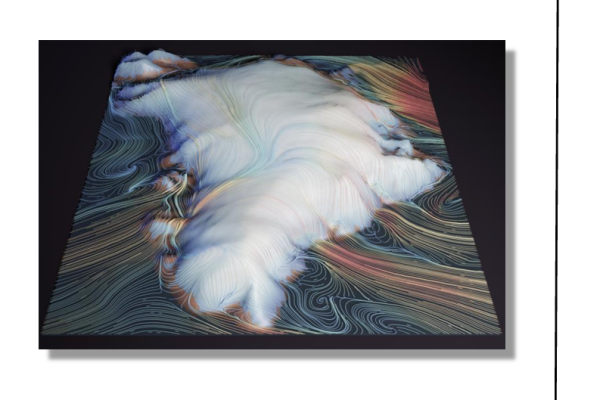
|
Our New CESM Science and Strategic Plan for 2023-2028 is now available. View the PDF from our news announcement page.
CESM On the Road
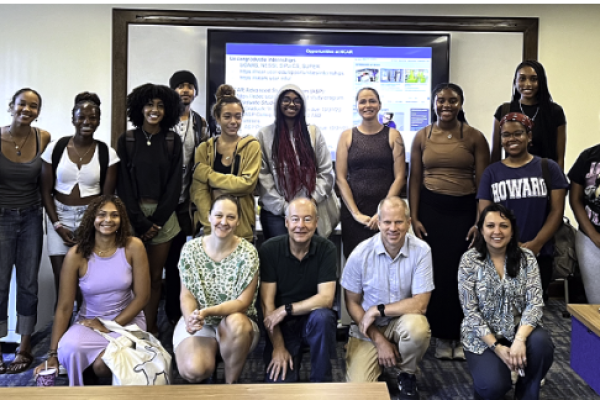
|
Atmospheric Sciences Department at Howard University
CGD scientists Gokhan Danabasoglu, Rich Neale, Alice DuVivier, and Monica Morrison, traveled this week to the Atmospheric Sciences Department at Howard University (a leading HBCU) in Washington D.C. While there, they met with several scientists, including Sonya Smith, the Director of the Atmospheric Sciences Department, Sen Chiao, the Director of the NOAA Cooperative Center at the university, as well as other faculty, including former ASP postdoc Osinachi Ajuko. The team presented on CGD science and CESM, and discussed potential collaborations with both faculty and students. While there the team also presented to an undergraduate class hosted by Nakul Karle and Debanjana Das on CESM and their personal journeys that led them all to climate science at NCAR.
CESM tutorial at the WCRP Open Science Conference
CGD scientists, SilverLining, and Amazon Web Services (AWS) are collaborating to offer a CESM tutorial at the WCRP Open Science Conference, taking place in Kigali, Rwanda from October 23 to 27, 2023.
The primary objective is to introduce WCRP participants and, in particular, Global South climate researchers, to CESM and the practice of utilizing cloud infrastructure for climate research. This is a key component of building connections between members of the CESM community around the globe.
The overarching goals are as follows:
-Teach participants about the basic functions of CESM and how to set-up, run and analyze CESM simulations.
-Build additional collaborations between members of the global CESM community to further develop expertise in data science and climate-relevant computing technologies.
-Raise awareness about the role of cloud computing in enhancing accessibility to climate information.
-Support UNFCCC COP commitments to mobilize Global North resources to support climate research in the Global South
Research Highlights from Our Community
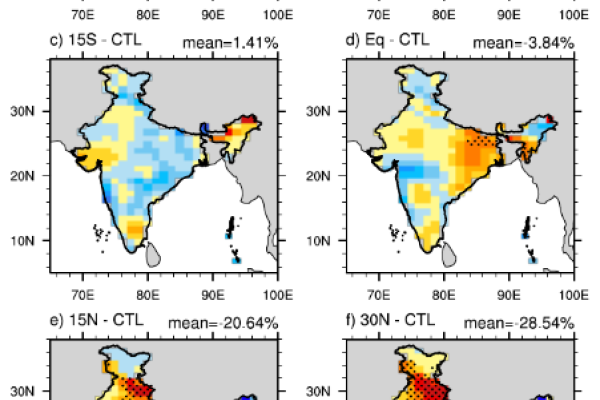
|
Climate Change Modeling Research from Prof. G Bala's Research Group at the Indian Institute of Science, Bengaluru, India
View a brief summary of our recent modeling research that used the NCAR CESM modeling framework. Research from the group involves applications of the model.
2024 Winter Working Group Meetings (Hybrid)
See the dates and times of upcoming working group meetings, scheduled for early 2024.
Thanks for reading our first CESM Newsletter! Expect to see the next one in January of 2024. Please send potential Newsletter items to Elizabeth Faircloth .

